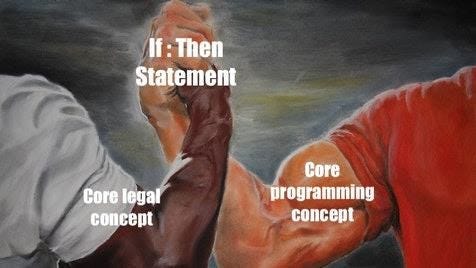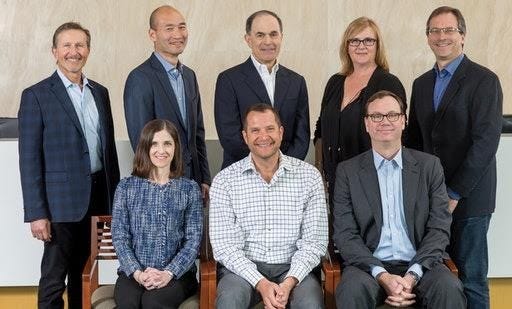Launching IF:Then
Opportunity via Community Kicks Off
Opportunity via Community
Already sold on the IF:Then Community? Shoot me an email: david@ifthen.vc
Congratulations!
The inaugural edition of the IF:Then newsletter has finally hit your inbox. What is IF:Then exactly? Well, it’s definitely not Brian Yorkey’s contemporary Broadway musical about living in New York today and all of the possibilities of tomorrow. I didn’t get past paragraph one of the wikipedia page, but it sounds like they’re going for a Sliding Doors type situation, feel free to let me know if you saw it.
IF:Then Venture Community
IF:Then is a mission-focused angel investor network. We invest in founders building in complex, challenging, or emerging legal and regulatory environments, and take a special interest in companies embedding legal strategy directly into their product to create new opportunities. Founders in our portfolio leverage our collective network to build their legal functions and turn regulatory strategy into a competitive advantage. Every investor says they’re a value-add, but we’ll actually be one.
IF:Then is a community. Invitation only membership, highly curated content, and engaged networking to accelerate your professional development. It is an email listserv, a slack workspace, stimulating discussions, in-person events, member spotlights, guest posts and anything else interesting that comes to mind. You’ll meet your peers, teach your peers, learn from your peers, send business to your peers, give jobs to your peers, and leverage the network of the whole community. Most of all you’ll meet some interesting people and have fun.
IF:Then represents the intersection of the law and technology. The inaugural cohort is focused on in-house tech attorneys and regulatory experts because we understand that to build and scale a company in a regulatory environment you need to make sound strategic decisions that can only come from truly understanding the business, the industry, and your customers. We wield our knowledge and understanding of the law as a tool, not to present even-handed evaluations of risk, but to drive the business forward.
IF:Then is a great fucking name! It embodies the concept of Sufficient Necessary -- lesson 1 in any good LSAT course. It also speaks toward conditionals in computer programming, a key aspect for languages to handle decisions!
Do I need to spell out the thematic parallels here?
Below, I’m going to set out my journey for starting IF:Then and why I believe this community address needs with founders/startups and with the attorneys themselves:
Legal Wayfinders. How in-house attorneys succeed by providing strategic help that we can bring to founders earlier in their journey.
Community Inspiration. How the power of community is being wielded today and why the legal field is getting left behind.
Pitch-Market Fit. How the message of IF:Then is already resonating with founders.
Looking Forward. Why IF:Then has a massive opportunity in front of it.
A Particular Set of Wills. What I am asking from you, future IF:Then member.
FAQs. The finer points of how this will work.
Think Differently
Working in legal at a startup is a fundamentally different job than working at a law firm. At a law firm, you’re incentivized to evaluate risk, to bill time, to make your client happy, to be generally conservative and even-handed, and to make sure you get that bonus, baby. At a startup you need to index decision-making — nobody is going to read your case law analysis. Because your colleagues are folks in marketing, operations, product, customer service, HR, and the C-Suite, you are approaching problems as the legal expert and source of truth. You are no longer “Getting to Maybe” but “Landing at How”.
Landing at How requires a strong internal brand for legal and compliance so that your colleagues come to you for guidance instead of approval. Landing at How requires you to develop deep understanding of everything happening at the company, including product, technology stack, acquisition strategy, personnel, and customers so that you can make fully informed decisions quickly. Landing at How means that in highly regulated spaces like financial services, healthcare or insurance, or better yet in emerging regulatory markets like cannabis or crypto, you will be a competitive advantage for the company.
Landing at How means becoming a legal wayfinder. Only then will you be a hugely valuable asset — a catalyst for growth.
Learning from Community; Growing via Community
My current role at Eaze involves finding ways to solve our most persistent problem — payments. It has become more strategy, partnerships, and product than legal, and required a deep understanding of the inner workings of fintech and financial services that I certainly did not have. Taking in information was relatively simple, but what really taught me how to approach solving problems was talking to the operators out there doing the work.
The best way to foster those conversations was by joining highly engaged communities. Some person or mechanism was fostering and coordinating content, collaborations, socials, presentations, meetups, and perhaps most importantly memes. It struck me how much more useful and interesting these communities were than most of what I experienced in the law.
It’s clear that community provides collective benefit, but in 2021 we’re expanding the concept and application of community, and those benefits have real business heft behind them — just look at meme stocks, affinity-based banking or really the entirety of crypto.
Creating Deal Flow with a Clear and Compelling Message
Ok so we’ve got the community, we’ve got some ideas around successfully operating legal at a startup, and we’ve even got extensive knowledge of the fintech space. Are we angel investors now?
Successful angel investing requires access to deal flow, access to capital and a compelling reason for founders to want you on their cap table.
Deal flow will be cultivated by conversations with founders around product strategy, partnerships, and thinking through ways to through and around regulatory obstacles. For companies later in their development, conversations will include making their first legal hire. These are conversations that virtually every founder in a regulated space is interested in having.
Not every attorney has experience thinking that way, and that’s where the mission of the community creates the “compelling reason” for a founder to want our help. IF:Then has found “pitch-market fit,” and the investing thesis has been resonating. When building product in a regulated space, high-level product strategy fueled by a network of legal wayfinders is something that IF:Then can provide in addition to early stage capital. The message is even stronger if those companies are building products embedding legal concepts to create new opportunities. When they need to make their first legal hire, or choose the right outside counsel, having legal wayfinders on the cap table is an attractive first step. Even if they are working with a Wilson, Goodwin, Cooley, or Gunderson, they understand the differentiated mindset and value that IF:Then can provide because what we offer is something new.
Ultimately, the message resonates because of the community. Portfolio growth will lead to more deal flow as it becomes clear that IF:Then delivers on its value proposition and strengthens our brand. This is a unique proposition that is not currently in the market and is filling a need.
Getting Off the Sidelines and Into the Game
IF:Then is access and opportunity. Although many lawyers are accredited investors, we’ve stayed away from this side of our industry and making these types of investments. Many of us don’t invest in early stage companies because it never occurs to us, and nobody asks us to. Most of us are not wealthy enough to do it on our own, and while crypto and Robinhood are always available, the best companies are staying private longer, and increasingly accruing their valuations in growth rounds. Those without access are locked out of that upside.
The IF:Then community flips this entire dynamic on its head. Community creates opportunity. Together, we have the access, we have the capital, and we have the message. We just need to make it happen.
Building the Brand and Engaging The Community
If there is opportunity in the now, the vision of the future is bright. Over the next six months, the focus will be on establishing the first cohort (that’s you!), fostering engagement, generating deal flow, and helping founders scale. We will build the IF:Then brand by making six to twelve $50,000 - $150,000 investments in exciting businesses with inspiring founders.
On the community side, I will continue to write this newsletter, with a new piece each week geared specifically towards this network. I will launch the Slack instance where we can communicate quickly and in real time. I will host at least one in-person event for the full community, because what’s an inaugural cohort without a celebration.
Over time, deal flow will start to come inbound. IF:Then is nascent now, but it can be a significant player in the future with the right execution. The value is there and we are the community to capture it, and have a great time along the way.
What I’m Asking From You
If you are willing to be an LP in the IF:Then Angel Syndicate, or if you’re in the legal/regulatory space and would like to join the IF:Then Community, or both these are the three things I ask that you be generally willing to do:
(Syndicate) Make investments: There are no hard commitments, but assuming a strong quantity and quality of deal flow, a benchmark expectation would be investing $10,000 over the next 6 months.
(Community) Engage with your peers: Participate in discussions, have 1-1s, answer questions, refer people to outside counsel, and generally add value.
(Both) Help portfolio companies: Or at least help me help them. This could be thinking through a problem, a 30 min phone call, or referring to another attorney. All potentially significant and not that time-intensive.
If you’re still with me, now is a great time to share IF:Then with a friend!
What’s Next?
If you are interested in being an IF:Then LP and/or Community Member please shoot me an email at david@ifthen.vc and we can discuss.
Is there a membership fee for the community?
There are currently no membership fees for being a part of the IF:Then and my goal is to keep it that way. The only cost will be the capital you invest in the deals you choose, and any time you spend helping founders (which should be pretty minimal for any given person).
Is this 100% in-house tech lawyers?
I’m generally welcoming of anyone interested with respect to the Syndicate.
For the community, I think it’s important to have a variety of perspectives so there will be outside counsel, compliance, folks working in government affairs, or those in government themselves.
Do I need to invest money upfront or participate in all deals?
No. All Syndicate investments will be made via Special Purpose Vehicle (“SPV”) which means that you can individually choose whether or not to invest. When you make an investment, you will own a percentage of a newly-created LLC that will go on the cap table of the portfolio company.
What if I don’t know anything about Fintech or other tech companies?
I will write a detailed investment memo with my thesis around the opportunity and its alignment with our mission for any deal I bring to the table. The goal is to bring everyone along. If you have any questions you can always ask, and this can be a great way to learn.
Is this going to take up a lot of time?
For me? Definitely. For you, no not really. Participating in the community should be fairly low lift — read the content, join the Slack and check in on it from time to time, and try to attend the occasional event. Stuff like helping founders should be very infrequent for any given person.
Do I need to worry about conflicts?
You can always choose not to participate in any given deal if the portfolio company is a competitor or there is otherwise some sort of conflict, and I won’t ask you to opine on it or speak with the founder. I will also refrain from sharing confidential information or a detailed investment memo until we clear our own light version of an internal conflict review.
Do I need to worry about giving legal advice?
Again, most/any conversations with founders should go through me, to maintain consistency of communication. In any case, I see most of our conversations as strategic at a high level rather than legal advice. If they want legal advice we can point them to a lawyer.
Can I recommend a friend to join the community?
Yes! I’m am leaving a healthy number of spaces open for strong recommendations from community members. If you know someone who would get benefit out of the community and is interesting in investing, please let me know.
How much do I need to invest in a given deal?
Minimum investment for any given deal will be $1,000.
What is the fee structure for the investments?
Each investment will have carried interest (“carry”) and an administrative fee to cover the costs of setting up and maintaining the SPV. For most deals I will take 20% carry, but in individual circumstances that may vary. If you bring in a deal that gets funded I will split the carry with you. The administrative fee will operate on a sliding scale but for most investments it will be a one-time, up front percentage of your investment. Probably around 4-5%.
I’m not interested in angel investing. Can I still join the community?
That’s fair enough, only you know your own personal financial situation. For an invitation only community, I’d generally be happy to have your perspective on board, especially if you are willing to attend events and help others. Reach out and lets discuss.
I’m interested in angel investing, but don’t have enough liquid capital. Any ideas?
Again, this is not financial advice, but some people might find it worthwhile to diversify their existing investment portfolio with high risk/high upside investments. For example, when I started angel investing I used a platform called Alto IRA to transfer a portion of my Latham 401k into a self-directed IRA that I could invest freely while maintaining its tax-advantaged status. [NOTE: AltoIRA recently was compromised and seemed to handle it pretty poorly. The concept still stands though, and they have a competitor Rocket Dollar. Fwiw I still plan to use Alto.] If I make any gains, I would have been even better off if I used a RothIRA like transfusion-enthusiast Peter Thiel. In any case, your mileage may vary on the wisdom of this, but for me it was simply adjusting the risk profile of an already-existing, already illiquid portfolio. Packy Mccormick has a good (sponsored) article on this.
When will we be able to see returns?
We will be able to track the companies progress as they will send out investor updates on progress, hiring, funding, valuation, etc. But bottom line, we will see disbursements if there is an acquisition or the company goes public. Since these are pre-seed or seed stage companies, we could see exits in 2 years or 10 years and on average somewhere in between. And yes, many will fail in that time period.
Any other ways I can help?
Definitely! In addition to simply participating, it would be greatly helpful for you to line up any intros to founders, VCs, or anyone else who might be helpful to the community.
Anything else I should know?
Most startups fail. The vast majority. Angel investments are both high-risk and illiquid. An angel investor should optimize for making as many bets as possible, so that the any winners make up for the losses. Consider how much you’d like to invest over six months and allocate your bets accordingly. And of course, DO NOT invest any money you can’t afford to lose. Even if we lose it all, IF:Then is positive vibes only.
Nothing in here is financial advice. I’m a guy who is introducing you to angel investments or giving access to my particular deal flow. The time is right for me, and you need to decide if its right for you.
As always, if you have any additional questions, please text me or shoot me an email at david@ifthen.vc or ikenna@ifthen.vc and one of those two guys will answer.















